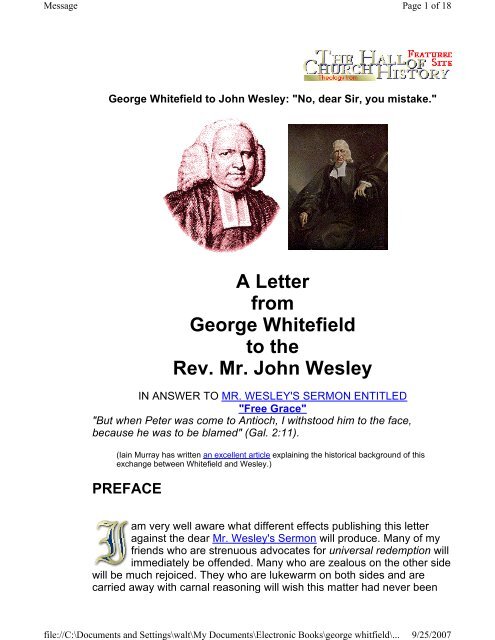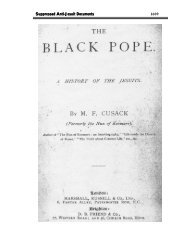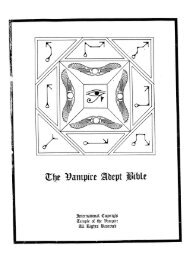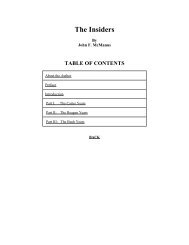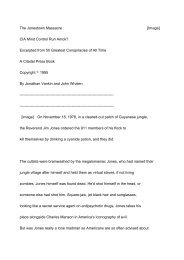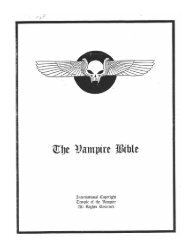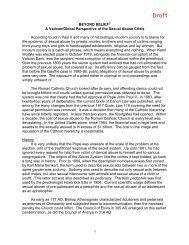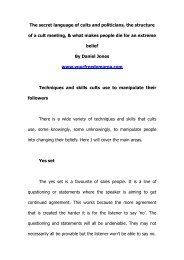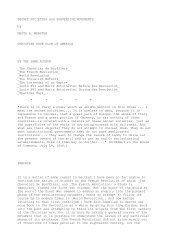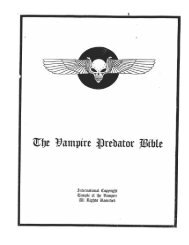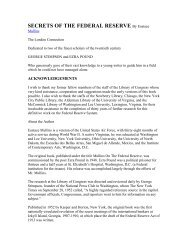letter to john wesley.pdf - Shattering Denial
letter to john wesley.pdf - Shattering Denial
letter to john wesley.pdf - Shattering Denial
Create successful ePaper yourself
Turn your PDF publications into a flip-book with our unique Google optimized e-Paper software.
Messagefile://C:\Documents and Settings\walt\My Documents\Electronic Books\george whitfield\...Page 1 of 189/25/2007George Whitefield <strong>to</strong> John Wesley: "No, dear Sir, you mistake."A LetterfromGeorge Whitefield<strong>to</strong> theRev. Mr. John WesleyIN ANSWER TO MR. WESLEY'S SERMON ENTITLED"Free Grace""But when Peter was come <strong>to</strong> Antioch, I withs<strong>to</strong>od him <strong>to</strong> the face,because he was <strong>to</strong> be blamed" (Gal. 2:11).(Iain Murray has written an excellent article explaining the his<strong>to</strong>rical background of thisexchange between Whitefield and Wesley.)PREFACEam very well aware what different effects publishing this <strong>letter</strong>against the dear Mr. Wesley's Sermon will produce. Many of myfriends who are strenuous advocates for universal redemption willimmediately be offended. Many who are zealous on the other sidewill be much rejoiced. They who are lukewarm on both sides and arecarried away with carnal reasoning will wish this matter had never been
Messagefile://C:\Documents and Settings\walt\My Documents\Electronic Books\george whitfield\...Page 2 of 189/25/2007brought under debate.The reasons I have given at the beginning of the <strong>letter</strong>, I think aresufficient <strong>to</strong> satisfy all of my conduct herein. I desire therefore that theywho hold election would not triumph, or make a party on one hand (for Idetest any such thing)—and that they who are prejudiced against thatdoctrine be not <strong>to</strong>o much concerned or offended on the other.Known un<strong>to</strong> God are all his ways from the beginning of the world. Thegreat day will discover why the Lord permits dear Mr. Wesley and me <strong>to</strong>be of a different way of thinking. At present, I shall make no enquiry in<strong>to</strong>that matter, beyond the account which he has given of it himself in thefollowing <strong>letter</strong>, which I lately received from his own dear hands:London, August 9, 1740My dear Brother,I thank you for yours, May the 24th. The case is quite plain. There arebigots both for predestination and against it. God is sending a message <strong>to</strong>those on either side. But neither will receive it, unless from one who is oftheir own opinion. Therefore, for a time you are suffered <strong>to</strong> be of oneopinion, and I of another. But when his time is come, God will do whatman cannot, namely, make us both of one mind. Then persecution willflame out, and it will be seen whether we count our lives dear un<strong>to</strong>ourselves, so that we may finish our course with joy. I am, my dearestbrother,Ever yours,J. WESLEYThus my honoured friend, I heartily pray God <strong>to</strong> hasten the time, forhis being clearly enlightened in<strong>to</strong> all the doctrines of divine revelation, thatwe may thus be closely united in principle and judgment as well as heartand affection. And then if the Lord should call us <strong>to</strong> it, I care not if I go withhim <strong>to</strong> prison, or <strong>to</strong> death. For like Paul and Silas, I hope we shall singpraises <strong>to</strong> God, and count it our highest honour <strong>to</strong> suffer for Christ's sake,and <strong>to</strong> lay down our lives for the brethren.WHITEFIELD'S LETTER TO WESLEYBethesda in Georgia, Dec. 24, 1740
Messagefile://C:\Documents and Settings\walt\My Documents\Electronic Books\george whitfield\...Page 3 of 189/25/2007Reverend and very dear Brother,od only knows what unspeakable sorrow of heart I have felt onyour account since I left England last. Whether it be my infirmityor not, I frankly confess, that Jonah could not go with morereluctance against Nineveh, than I now take pen in hand <strong>to</strong> writeagainst you. Was nature <strong>to</strong> speak, I had rather die than do it; and yet if Iam faithful <strong>to</strong> God, and <strong>to</strong> my own and others' souls, I must not standneutral any longer. I am very apprehensive that our common adversarieswill rejoice <strong>to</strong> see us differing among ourselves. But what can I say? Thechildren of God are in danger of falling in<strong>to</strong> error. Nay, numbers havebeen misled, whom God has been pleased <strong>to</strong> work upon by my ministry,and a greater number are still calling aloud upon me <strong>to</strong> show also myopinion. I must then show that I know no man after the flesh, and that Ihave no respect <strong>to</strong> persons, any further than is consistent with my duty <strong>to</strong>my Lord and Master, Jesus Christ.This <strong>letter</strong>, no doubt, will lose me many friends: and for this causeperhaps God has laid this difficult task upon me, even <strong>to</strong> see whether I amwilling <strong>to</strong> forsake all for him, or not. From such considerations as these, Ithink it my duty <strong>to</strong> bear an humble testimony, and earnestly <strong>to</strong> plead forthe truths which, I am convinced, are clearly revealed in the Word of God.In the defence whereof I must use great plainness of speech, and treat mydearest friends upon earth with the greatest simplicity, faithfulness, andfreedom, leaving the consequences of all <strong>to</strong> God.For some time before, and especially since my last departure fromEngland, both in public and private, by preaching and printing, you havebeen propagating the doctrine of universal redemption. And when Iremember how Paul reproved Peter for his dissimulation, I fear I havebeen sinfully silent <strong>to</strong>o long. O then be not angry with me, dear andhonoured Sir, if now I deliver my soul, by telling you that I think in this yougreatly err.'Tis not my design <strong>to</strong> enter in<strong>to</strong> a long debate on God's decrees. I referyou <strong>to</strong> Dr. Edwards his Veritas Redux [1], which, I think is unanswerable—except in a certain point, concerning a middle sort between elect andreprobate, which he himself in effect afterwards condemns.I shall only make a few remarks upon your sermon, entitled FreeGrace." And before I enter upon the discourse itself, give me leave <strong>to</strong> takea little notice of what in your Preface you term an indispensable obligation<strong>to</strong> make it public <strong>to</strong> all the world. I must own, that I always thought youwere quite mistaken upon that head.The case (you know) stands thus: When you were at Bris<strong>to</strong>l, I thinkyou received a <strong>letter</strong> from a private hand, charging you with not preachingthe gospel, because you did not preach up election. Upon this you drew alot: the answer was "preach and print." I have often questioned, as I do
Messagefile://C:\Documents and Settings\walt\My Documents\Electronic Books\george whitfield\...Page 4 of 189/25/2007now, whether in so doing, you did not tempt the Lord. A due exercise ofreligious prudence, without [the drawing of] a lot, would have directed youin that matter. Besides, I never heard that you enquired of God, whetheror not election was a gospel doctrine.But, I fear, taking it for granted [that election was not a biblical truth],you only enquired whether you should be silent or preach and printagainst it.However this be, the lot came out "preach and print"; accordingly youpreached and printed against election. At my desire, you suppressed thepublishing of the sermon whilst I was in England; but you soon sent it in<strong>to</strong>the world after my departure. O that you had kept it in! However, if thatsermon was printed in answer <strong>to</strong> a lot, I am apt <strong>to</strong> think, one reason whyGod should so suffer you <strong>to</strong> be deceived, was, that hereby a specialobligation might be laid upon me, faithfully <strong>to</strong> declare the Scripturedoctrine of election, that thus the Lord might give me a fresh opportunity ofseeing what was in my heart, and whether I would be true <strong>to</strong> his cause ornot; as you could not but grant, he did once before, by giving you suchanother lot at Deal.The morning I sailed from Deal for Gibraltar [2 February 1738], youarrived from Georgia. Instead of giving me an opportunity <strong>to</strong> converse withyou, though the ship was not far off the shore, you drew a lot, andimmediately set forward <strong>to</strong> London. You left a <strong>letter</strong> behind you, in whichwere words <strong>to</strong> this effect: "When I saw [that] God, by the wind which wascarrying you out, brought me in, I asked counsel of God. His answer youhave enclosed." This was a piece of paper, in which were written thesewords, "Let him return <strong>to</strong> London."When I received this, I was somewhat surprised. Here was a goodman telling me he had cast a lot, and that God would have me return <strong>to</strong>London. On the other hand, I knew my call was <strong>to</strong> Georgia, and that I hadtaken leave of London, and could not justly go from the soldiers, who werecommitted <strong>to</strong> my charge. I be<strong>to</strong>ok myself with a friend <strong>to</strong> prayer. Thatpassage in 1 Kings 13 was powerfully impressed upon my soul, where weare <strong>to</strong>ld that the Prophet was slain by a lion when he was tempted <strong>to</strong> goback (contrary <strong>to</strong> God's express order) upon another Prophet's telling himGod would have him do so. I wrote you word that I could not return <strong>to</strong>London. We sailed immediately.Some months after, I received a <strong>letter</strong> from you at Georgia, whereinyou wrote words <strong>to</strong> this effect: "Though God never before gave me awrong lot, yet, perhaps, he suffered me <strong>to</strong> have such a lot at that time, <strong>to</strong>try what was in your heart." I should never have published this privatetransaction <strong>to</strong> the world, did not the glory of God call me <strong>to</strong> it. It is plainyou had a wrong lot given you here, and justly, because you tempted Godin drawing one. And thus I believe it is in the present case. And if so, letnot the children of God who are mine and your intimate friends, and also
Messagefile://C:\Documents and Settings\walt\My Documents\Electronic Books\george whitfield\...Page 5 of 189/25/2007advocates for universal redemption, think that doctrine true—because youpreached it up in compliance with a lot given out from God.This, I think, may serve as an answer <strong>to</strong> that part of the Preface <strong>to</strong>your printed sermon, wherein you say, "Nothing but the strongestconviction, not only that what is here advanced is the truth as it is inJesus, but also that I am indispensably obliged <strong>to</strong> declare this truth <strong>to</strong> allthe world." That you believe what you have written <strong>to</strong> be truth, and thatyou honestly aim at God's glory in writing, I do not in the least doubt. Butthen, honoured Sir, I cannot but think you have been much mistaken inimagining that your tempting God, by casting a lot in the manner you didcould lay you under an indispensable obligation <strong>to</strong> any action, much less<strong>to</strong> publish your sermon against the doctrine of predestination <strong>to</strong> life.I must next observe, that as you have been unhappy in printing at allupon such an imaginary warrant, so you have been as unhappy in thechoice of your text. Honoured Sir, how could it enter in<strong>to</strong> your heart <strong>to</strong>choose a text <strong>to</strong> disprove the doctrine of election out of Romans 8, wherethis doctrine is so plainly asserted? Once I spoke with a Quaker upon thissubject, and he had no other way of evading the force of the Apostle'sassertion than by saying, "I believe Paul was in the wrong." And anotherfriend lately, who was once highly prejudiced against election, ingenuouslyconfessed that he used <strong>to</strong> think St. Paul himself was mistaken, or that hewas not truly translated.Indeed, honoured Sir, it is plain beyond all contradiction that St. Paul,through the whole of Romans 8, is speaking of the privileges of those onlywho are really in Christ. And let any unprejudiced person read what goesbefore and what follows your text, and he must confess the word "all" onlysignifies those that are in Christ. And the latter part of the text plainlyproves, what, I find, dear Mr. Wesley will, by no means, grant. I mean thefinal perseverance of the children of God: "He that spared not his ownSon, but delivered him up for us all, [i.e., all Saints] how shall he not withhim also freely give us all things?" (Rom. 8:32). [He shall give us] grace, inparticular, <strong>to</strong> enable us <strong>to</strong> persevere, and every thing else necessary <strong>to</strong>carry us home <strong>to</strong> our Father's heavenly kingdom.Had any one a mind <strong>to</strong> prove the doctrine of election, as well as offinal perseverance, he could hardly wish for a text more fit for his purposethan that which you have chosen <strong>to</strong> disprove it! One who did not know youwould suspect that you were aware of this, for after the first paragraph, Iscarce know whether you have mentioned [the text] so much as oncethrough your whole sermon.But your discourse, in my opinion, is as little <strong>to</strong> the purpose as yourtext, and instead of warping, does but more and more confirm me in thebelief of the doctrine of God's eternal election.I shall not mention how illogically you have proceeded. Had youwritten clearly, you should first, honoured Sir, have proved your
Messagefile://C:\Documents and Settings\walt\My Documents\Electronic Books\george whitfield\...Page 7 of 189/25/2007econd, you say that the doctrine of election and reprobationdirectly tends <strong>to</strong> destroy holiness, which is the end of all theordinances of God. For (says the dear mistaken Mr. Wesley) "itwholly takes away those first motives <strong>to</strong> follow after it, sofrequently proposed in Scripture. The hope of future reward, and fear ofpunishment, the hope of heaven, and the fear of hell, et cetera."I thought that one who carries perfection <strong>to</strong> such an exalted pitch asdear Mr. Wesley does, would know that a true lover of the Lord JesusChrist would strive <strong>to</strong> be holy for the sake of being holy, and work forChrist out of love and gratitude, without any regard <strong>to</strong> the rewards ofheaven, or fear of hell. You remember, dear Sir, what Scougal says,"Love's a more powerful motive that does them move." But passing bythis, and granting that rewards and punishments (as they certainly are)may be motives from which a Christian may be honestly stirred up <strong>to</strong> actfor God, how does the doctrine of election destroy these motives? Do notthe elect know that the more good works they do, the greater will be theirreward? And is not that encouragement enough <strong>to</strong> set them upon, andcause them <strong>to</strong> persevere in working for Jesus Christ? And how does thedoctrine of election destroy holiness? Who ever preached any otherelection than what the Apostle preached, when he said, "Chosen . . .through sanctification of the Spirit?" (2 Thess. 2:13). Nay, is not holinessmade a mark of our election by all that preach it? And how then can thedoctrine of election destroy holiness?The instance which you bring <strong>to</strong> illustrate your assertion, indeed, dearSir, is quite impertinent. For you say, "If a sick man knows that he mustunavoidably die or unavoidably recover, though he knows not which, it isnot reasonable <strong>to</strong> take any physic at all." Dear Sir, what absurd reasoningis here? Were you ever sick in your life? If so, did not the bare probabilityor possibility of your recovering, though you knew it was unalterably fixedthat you must live or die, encourage you <strong>to</strong> take physic? For how did youknow but that very physic might be the means God intended <strong>to</strong> recoveryou by?Just thus it is as <strong>to</strong> the doctrine of election. I know that it is unalterablyfixed (one may say) that I must be damned or saved; but since I know notwhich for a certainty, why should I not strive, though at present in a stateof nature, since I know not but this striving may be the means God hasintended <strong>to</strong> bless, in order <strong>to</strong> bring me in<strong>to</strong> a state of grace?Dear Sir, consider these things. Make an impartial application, andthen judge what little reason you had <strong>to</strong> conclude the 10th paragraph,page 12, with these words: "So directly does this doctrine tend <strong>to</strong> shut thevery gate of holiness in general, <strong>to</strong> hinder unholy men from everapproaching there<strong>to</strong>, or striving <strong>to</strong> enter in thereat.""As directly," you say, "does the doctrine tend <strong>to</strong> destroy severalparticular branches of holiness, such as meekness, love, et cetera." I shall
Messagefile://C:\Documents and Settings\walt\My Documents\Electronic Books\george whitfield\...Page 8 of 189/25/2007say little, dear Sir, in answer <strong>to</strong> this paragraph. Dear Mr. Wesley perhapshas been disputing with some warm narrow-spirited men that heldelection, and then he infers that their warmth and narrowness of spirit wasowing <strong>to</strong> their principles? But does not dear Mr. Wesley know many dearchildren of God, who are predestinarians, and yet are meek, lowly, pitiful,courteous, tender- hearted, kind, of a catholic spirit, and hope <strong>to</strong> see themost vile and profligate of men converted? And why? because they knowGod saved themselves by an act of his electing love, and they know notbut he may have elected those who now seem <strong>to</strong> be the most abandoned.But, dear Sir, we must not judge of the truth of principles in general,nor of this of election in particular, entirely from the practice of some thatprofess <strong>to</strong> hold them. If so, I am sure much might be said against yourown. For I appeal <strong>to</strong> your own heart, whether or not you have not felt inyourself, or observed in others, a narrow-spiritedness, and some disunionof soul respecting those that hold universal redemption. If so, thenaccording <strong>to</strong> your own rule, universal redemption is wrong, because itdestroys several branches of holiness, such as meekness, love, et cetera.But not <strong>to</strong> insist upon this, I beg you would observe that your inference isentirely set aside by the force of the Apostle's argument, and the languagewhich he expressly uses in Colossians 3:12-13: "Put on therefore, as theelect of God, holy and beloved, bowels of mercies, kindness, humblenessof mind, meekness, longsuffering; forbearing one another, and forgivingone another, if any man have a quarrel against any: even as Christforgave you, so also do ye."Here we see that the Apostle exhorts them <strong>to</strong> put on bowels of mercy,kindness, humbleness of mind, meekness, long-suffering, et cetera, uponthis consideration: namely, because they were elect of God. And all whohave experientially felt this doctrine in their hearts feel that these gracesare the genuine effects of their being elected of God.But perhaps dear Mr. Wesley may be mistaken in this point, and callthat passion which is only zeal for God's truths. You know, dear Sir, theApostle exhorts us <strong>to</strong> "contend earnestly for the faith once delivered <strong>to</strong> thesaints" (Jude 3). Therefore you must not condemn all that appear zealousfor the doctrine of election as narrow-spirited, or persecu<strong>to</strong>rs, just becausethey think it their duty <strong>to</strong> oppose you. I am sure, I love you in the bowels ofJesus Christ, and think I could lay down my life for your sake; but yet, dearSir, I cannot help strenuously opposing your errors upon this importantsubject, because I think you warmly, though not designedly, oppose thetruth, as it is in Jesus. May the Lord remove the scales of prejudice fromoff the eyes of your mind and give you a zeal according <strong>to</strong> true Christianknowledge!hird, says your sermon, "This doctrine tends <strong>to</strong> destroy thecomforts of religion, the happiness of Christianity, et cetera."But how does Mr. Wesley know this, who never believed
Messagefile://C:\Documents and Settings\walt\My Documents\Electronic Books\george whitfield\...Page 9 of 189/25/2007election? I believe they who have experienced it will agree with our 17tharticle, that "the godly consideration of predestination, and election inChrist, is full of sweet, pleasant, unspeakable comfort <strong>to</strong> godly persons,and such as feel in themselves the working of the Spirit of Christ,mortifying the works of the flesh, and their earthly members, and drawingtheir minds <strong>to</strong> high and heavenly things, as well because it does greatlyestablish and confirm their faith of eternal salvation, <strong>to</strong> be enjoyed throughChrist, as because it doth fervently kindle their love <strong>to</strong>wards God," etcetera.This plainly shows that our godly reformers did not think electiondestroyed holiness or the comforts of religion. As for my own part, thisdoctrine is my daily support. I should utterly sink under a dread of myimpending trials, were I not firmly persuaded that God has chosen me inChrist from before the foundation of the world, and that now beingeffectually called, he will allow no one <strong>to</strong> pluck me out of his almightyhand.You proceed thus: "This is evident as <strong>to</strong> all those who believethemselves <strong>to</strong> be reprobate, or only suspect or fear it; all the great andprecious promises are lost <strong>to</strong> them; they afford them no ray of comfort."In answer <strong>to</strong> this, let me observe that none living, especially none whoare desirous of salvation, can know that they are not of the number ofGod's elect. None but the unconverted, can have any just reason so muchas <strong>to</strong> fear it. And would dear Mr. Wesley give comfort, or dare you applythe precious promises of the gospel, being children's bread, <strong>to</strong> men in anatural state, while they continue so? God forbid! What if the doctrine ofelection and reprobation does put some upon doubting? So does that ofregeneration. But, is not this doubting a good means <strong>to</strong> put them uponsearching and striving; and that striving, a good means <strong>to</strong> make theircalling and their election sure?This is one reason among many others why I admire the doctrine ofelection and am convinced that it should have a place in gospelministrations and should be insisted on with faithfulness and care. It has anatural tendency <strong>to</strong> rouse the soul out of its carnal security. And thereforemany carnal men cry out against it. Whereas universal redemption is anotion sadly adapted <strong>to</strong> keep the soul in its lethargic sleepy condition, andtherefore so many natural men admire and applaud it.Your 13th, 14th and 15th paragraphs come next <strong>to</strong> be considered."The witness of the Spirit," you say, "experience shows <strong>to</strong> be muchobstructed by this doctrine."But, dear Sir, whose experience? Not your own; for in your journal,from your embarking for Georgia, <strong>to</strong> your return <strong>to</strong> London, you seem <strong>to</strong>acknowledge that you have it not, and therefore you are no competentjudge in this matter. You must mean then the experience of others. Foryou say in the same paragraph, "Even in those who have tasted of that
Messagefile://C:\Documents and Settings\walt\My Documents\Electronic Books\george whitfield\...Page 10 of 189/25/2007good gift, who yet have soon lost it again," (I suppose you mean lost thesense of it again) "and fallen back in<strong>to</strong> doubts and fears and darkness,even horrible darkness that might be felt, et cetera." Now, as <strong>to</strong> thedarkness of desertion, was not this the case of Jesus Christ himself, afterhe had received an unmeasurable unction of the Holy Ghost? Was not hissoul exceeding sorrowful, even un<strong>to</strong> death, in the garden? And was he notsurrounded with an horrible darkness, even a darkness that might be felt,when on the cross he cried out, "My God! My God! why hast thou forsakenme?"And that all his followers are liable <strong>to</strong> the same, is it not evident fromScripture? For, says the Apostle, "He was tempted in all things like as weare" (Heb 4:15) so that he himself might be able <strong>to</strong> succour those that aretempted (Heb. 2:18). And is not their liableness thereun<strong>to</strong> consistent withthat conformity <strong>to</strong> him in suffering, which his members are <strong>to</strong> bear (Phil.3:10)? Why then should persons falling in<strong>to</strong> darkness, after they havereceived the witness of the Spirit, be any argument against the doctrine ofelection?"Yet," you say, "many, very many of those that hold it not, in all partsof the earth, have enjoyed the uninterrupted witness of the Spirit, thecontinual light of God's countenance, from the moment wherein they firstbelieved, for many months or years, <strong>to</strong> this very day." But how does dearMr. Wesley know this? Has he consulted the experience of many, verymany in all parts of the earth? Or could he be sure of what he hathadvanced without sufficient grounds, would it follow that their being kept inthis light is owing <strong>to</strong> their not believing the doctrine of election? No, this[doctrine], according <strong>to</strong> the sentiments of our church, "greatly confirms andestablishes a true Christian's faith of eternal salvation through Christ," andis an anchor of hope, both sure and steadfast, when he walks in darknessand sees no light; as certainly he may, even after he hath received thewitness of the Spirit, whatever you or others may unadvisedly assert <strong>to</strong> thecontrary.Then, <strong>to</strong> have respect <strong>to</strong> God's everlasting covenant, and <strong>to</strong> throwhimself upon the free distinguishing love of that God who changeth not,will make him lift up the hands that hang down, and strengthen the feebleknees.But without the belief of the doctrine of election, and the immutabilityof the free love of God, I cannot see how it is possible that any shouldhave a comfortable assurance of eternal salvation. What could it signify <strong>to</strong>a man whose conscience is thoroughly awakened, and who is warned ingood earnest <strong>to</strong> seek deliverance from the wrath <strong>to</strong> come, though heshould be assured that all his past sins be forgiven, and that he is now achild of God; if notwithstanding this, he may hereafter become a child ofthe devil, and be cast in<strong>to</strong> hell at last? Could such an assurance yield anysolid, lasting comfort <strong>to</strong> a person convinced of the corruption and
Messagefile://C:\Documents and Settings\walt\My Documents\Electronic Books\george whitfield\...Page 11 of 189/25/2007treachery of his own heart, and of the malice, subtlety, and power ofSatan? No! That which alone deserves the name of a full assurance offaith is such an assurance as emboldens the believer, under the sense ofhis interest in distinguishing love, <strong>to</strong> give the challenge <strong>to</strong> all hisadversaries, whether men or devils, and that with regard <strong>to</strong> all their future,as well as present, attempts <strong>to</strong> destroy—saying with the Apostle,Who shall lay any thing <strong>to</strong> the charge of God's elect? It is Godthat justifieth. Who is he that condemneth? It is Christ that died,yea rather, that is risen again, who is even at the right hand ofGod, who also maketh intercession for us. Who shall separateus from the love of Christ? shall tribulation, or distress, orpersecution, or famine, or nakedness, or peril, or sword? As it iswritten, For thy sake we are killed all the day long; we areaccounted as sheep for the slaughter. Nay, in all these thingswe are more than conquerors through him that loved us. For Iam persuaded, that neither death, nor life, nor angels, norprincipalities, nor powers, nor things present, nor things <strong>to</strong>come, nor height, nor depth, nor any other creature, shall beable <strong>to</strong> separate us from the love of God, which is in ChristJesus our Lord (Rom. 8:33-39).This, dear Sir, is the triumphant language of every soul that hasattained a full assurance of faith. And this assurance can only arise from abelief of God's electing everlasting love. That many have an assurancethey are in Christ <strong>to</strong>day, but take no thought for, or are not assured theyshall be in him <strong>to</strong>morrow—nay <strong>to</strong> all eternity—is rather their imperfectionand unhappiness than their privilege. I pray God <strong>to</strong> bring all such <strong>to</strong> asense of his eternal love, that they may no longer build upon their ownfaithfulness, but on the unchangeableness of that God whose gifts andcallings are without repentance. For those whom God has once justified,he also will glorify.I observed before, dear Sir, it is not always a safe rule <strong>to</strong> judge of thetruth of principles from people's practice. And therefore, supposing that allwho hold universal redemption in your way of explaining it, after theyreceived faith, enjoyed the continual uninterrupted sight of God'scountenance, it does not follow that this is a fruit of their principle. For thatI am sure has a natural tendency <strong>to</strong> keep the soul in darkness for ever,because the creature thereby is taught that his being kept in a state ofsalvation is owing <strong>to</strong> his own free will. And what a sandy foundation is thatfor a poor creature <strong>to</strong> build his hopes of perseverance upon? Everyrelapse in<strong>to</strong> sin, every surprise by temptation, must throw him "in<strong>to</strong> doubtsand fears, in<strong>to</strong> horrible darkness, even darkness that may be felt."
Messagefile://C:\Documents and Settings\walt\My Documents\Electronic Books\george whitfield\...Page 12 of 189/25/2007Hence it is that the <strong>letter</strong>s which have been lately sent me by thosewho hold universal redemption are dead and lifeless, dry and inconsistent,in comparison of those I receive from persons on the contrary side. Thosewho settle in the universal scheme, though they might begin in the Spirit,(whatever they may say <strong>to</strong> the contrary) are ending in the flesh, andbuilding up a righteousness founded on their own free will: whilst theothers triumph in hope of the glory of God, and build upon God's neverfailingpromise and unchangeable love, even when his sensible presenceis withdrawn from them.But I would not judge of the truth of election by the experience of anyparticular persons: if I did (O bear with me in this foolishness of boasting) Ithink I myself might glory in election. For these five or six years I havereceived the witness of God's Spirit; since that, blessed be God, I have notdoubted a quarter of an hour of a saving interest in Jesus Christ: but withgrief and humble shame I do acknowledge, I have fallen in<strong>to</strong> sin oftensince that. Though I do not—dare not—allow of any one transgression, yethither<strong>to</strong> I have not been (nor do I expect that while I am in this presentworld I ever shall be) able <strong>to</strong> live one day perfectly free from all defectsand sin. And since the Scriptures declare that there is not a just man uponearth (no, not among those of the highest attainments in grace) that doethgood and sinneth not (Eccl. 7:20), we are sure that this will be the case ofall the children of God.The universal experience and acknowledgement of this among thegodly in every age is abundantly sufficient <strong>to</strong> confute the error of thosewho hold in an absolute sense that after a man is born again he cannotcommit sin. Especially since the Holy Spirit condemns the persons whosay they have no sin as deceiving themselves, as being destitute of thetruth, and as making God a liar (1 Jn. 1:8, 10). I have been also inheaviness through manifold temptations, and expect <strong>to</strong> be often so beforeI die. Thus were the Apostles and primitive Christians themselves. Thuswas Luther, that man of God, who, as far as I can find, did notperemp<strong>to</strong>rily, at least, hold election; and the great John Arndt was in theutmost perplexity, but a quarter of an hour before he died, and yet he wasno predestinarian.And if I must speak freely, I believe your fighting so strenuouslyagainst the doctrine of election and pleading so vehemently for a sinlessperfection are among the reasons or culpable causes, why you are kep<strong>to</strong>ut of the liberties of the gospel, and from that full assurance of faith whichthey enjoy, who have experimentally tasted, and daily feed upon God'selecting, everlasting love.But perhaps you may say, that Luther and Arndt were no Christians, atleast very weak ones. I know you think meanly of Abraham, though hewas eminently called the friend of God: and, I believe, also of David, theman after God's own heart. No wonder, therefore, that in a <strong>letter</strong> you sent
Messagefile://C:\Documents and Settings\walt\My Documents\Electronic Books\george whitfield\...Page 13 of 189/25/2007me not long since, you should tell me that no Baptist or Presbyterian writerwhom you have read knew anything of the liberties of Christ. What?Neither Bunyan, Henry, Flavel, Halybur<strong>to</strong>n, nor any of the New Englandand Scots divines? See, dear Sir, what narrow-spiritedness and want ofcharity arise from your principles, and then do not cry out against electionany more on account of its being "destructive of meekness and love."ourth, I shall now proceed <strong>to</strong> another head. Says the dear Mr.Wesley, "How uncomfortable a thought is this, that thousandsand millions of men, without any preceding offence or fault oftheirs, were unchangeably doomed <strong>to</strong> everlasting burnings?"But who ever asserted, that thousands and millions of men,without any preceding offence or fault of theirs, were unchangeablydoomed <strong>to</strong> everlasting burnings? Do not they who believe God's doomingmen <strong>to</strong> everlasting burnings, also believe, that God looked upon them asmen fallen in Adam? And that the decree which ordained the punishmentfirst regarded the crime by which it was deserved? How then are theydoomed without any preceding fault? Surely Mr. Wesley will own God'sjustice in imputing Adam's sin <strong>to</strong> his posterity. And also, after Adam fell,and his posterity in him, God might justly have passed them all by, withoutsending his own Son <strong>to</strong> be a saviour for any one. Unless you heartilyagree <strong>to</strong> both these points, you do not believe original sin aright. If you doown them, then you must acknowledge the doctrine of election andreprobation <strong>to</strong> be highly just and reasonable. For if God might justlyimpute Adam's sin <strong>to</strong> all, and afterwards have passed by all, then he mightjustly pass by some. Turn on the right hand, or on the left; you arereduced <strong>to</strong> an inextricable dilemma. And, if you would be consistent, youmust either give up the doctrine of the imputation of Adam's sin, or receivethe amiable doctrine of election, with a holy and righteous reprobation asits consequent. For whether you can believe it or not, the Word of Godabides faithful: "The election hath obtained it, and the rest wereblinded" (Rom. 11:7).Your 17th paragraph, page 16, I pass over. What has been said on the9th and 10th paragraphs, with a little alteration, will answer it. I shall onlysay, it is the doctrine of election that most presses me <strong>to</strong> abound in goodworks. I am willing <strong>to</strong> suffer all things for the elect's sake. This makes me<strong>to</strong> preach with comfort, because I know salvation does not depend onman's free will, but the Lord makes willing in the day of his power, and canmake use of me <strong>to</strong> bring some of his elect home, when and where hepleases.ut, Fifth, you say, "This doctrine has a direct manifest tendency<strong>to</strong> overthrow the whole Christian religion. For," say you,"supposing that eternal, unchangeable decree, one part ofmankind must be saved, though the Christian revelation werenot in being."
Messagefile://C:\Documents and Settings\walt\My Documents\Electronic Books\george whitfield\...Page 14 of 189/25/2007But, dear Sir, how does that follow? Since it is only by the Christianrevelation that we are acquainted with God's design of saving his churchby the death of his Son. Yea, it is settled in the everlasting covenant thatthis salvation shall be applied <strong>to</strong> the elect through the knowledge and faithof him. As the prophet says in Isaiah 53:11, "By his knowledge shall myrighteous servant justify many." How then has the doctrine of election adirect tendency <strong>to</strong> overthrow the whole Christian revelation? Who everthought that God's declaration <strong>to</strong> Noah, that seed-time and harvest shouldnever cease, could afford an argument for the neglect of plowing orsowing? Or that the unchangeable purpose of God, that harvest shouldnot fail, rendered the heat of the sun, or the influence of the heavenlybodies unnecessary <strong>to</strong> produce it? No more does God's absolute purposeof saving his chosen preclude the necessity of the gospel revelation, orthe use of any of the means through which he has determined the decreeshall take effect. Nor will the right understanding, or the reverent belief ofGod's decree, ever allow or suffer a Christian in any case <strong>to</strong> separate themeans from the end, or the end from the means.And since we are taught by the revelation itself that this was intendedand given by God as a means of bringing home his elect, we thereforereceive it with joy, prize it highly, use it in faith, and endeavour <strong>to</strong> spread itthrough all the world, in the full assurance, that wherever God sends it,sooner or later, it shall be savingly useful <strong>to</strong> all the elect within its call.How then, in holding this doctrine, do we join with modern unbelieversin making the Christian revelation unnecessary? No, dear Sir, youmistake. Infidels of all kinds are on your side of the question. Deists,Arians, and Socinians arraign God's sovereignty and stand up foruniversal redemption. I pray God that dear Mr. Wesley's sermon, as it hasgrieved the hearts of many of God's children, may not also strengthen thehands of many of his most avowed enemies!Here I could almost lie down and weep. "Tell it not in Gath, publish itnot in the streets of Askelon; lest the daughters of the Philistines rejoice,lest the daughters of the uncircumcised triumph" (2 Sam. 1:20).Further, you say, "This doctrine makes revelation contradict itself." Forinstance, say you, "The asser<strong>to</strong>rs of this doctrine interpret that text ofScripture, Jacob have I loved, but Esau have I hated, as implying thatGod, in a literal sense, hated Esau and all the reprobates from eternity!"And, when considered as fallen in Adam, were they not objects of hishatred? And might not God, of his own good pleasure, love or show mercy<strong>to</strong> Jacob and the elect—and yet at the same time do the reprobate nowrong? But you say, "God is love." And cannot God be love, unless heshows the same mercy <strong>to</strong> all?Again, says dear Mr. Wesley, "They infer from that text, 'I will havemercy on whom I will have mercy,' that God is merciful only <strong>to</strong> some men,viz the elect; and that he has mercy for those only, flatly contrary <strong>to</strong> which
Messagefile://C:\Documents and Settings\walt\My Documents\Electronic Books\george whitfield\...Page 15 of 189/25/2007is the whole tenor of the Scripture, as is that express declaration inparticular, 'The Lord is loving <strong>to</strong> every man, and his mercy is over all hisworks.'"And so it is, but not his saving mercy. God is loving <strong>to</strong> every man: hesends his rain upon the evil and upon the good. But you say, "God is norespecter of persons" (Acts 10:34). No! For every one, whether Jew orGentile, that believeth on Jesus, and worketh righteousness, is acceptedof him. "But he that believeth not shall be damned" (Mk. 16:16). For Godis no respecter of persons, upon the account of any outward condition orcircumstance in life whatever; nor does the doctrine of election in the leastsuppose him <strong>to</strong> be so. But as the sovereign Lord of all, who is deb<strong>to</strong>r <strong>to</strong>none, he has a right <strong>to</strong> do what he will with his own, and <strong>to</strong> dispense hisfavours <strong>to</strong> what objects he sees fit, merely at his pleasure. And hissupreme right herein is clearly and strongly asserted in those passages ofScripture, where he says, "Moses, I will have mercy on whom I will havemercy, and I will have compassion on whom I will havecompassion" (Rom. 9:15, Exod. 33:19).Further, from the text, "the children being not yet born, neither havingdone any good or evil, that the purpose of God according <strong>to</strong> election mightstand, not of works, but of him that calleth; it was said un<strong>to</strong> her [Rebekah],The elder shall serve the younger" (Rom. 9:11-12)—you represent us asinferring that our predestination <strong>to</strong> life in no way depends on theforeknowledge of God.But who infers this, dear Sir? For if foreknowledge signifiesapprobation, as it does in several parts of Scripture, then we confess thatpredestination and election do depend on God's foreknowledge. But if byGod's foreknowledge you understand God's fore-seeing some good worksdone by his creatures as the foundation or reason of choosing them andtherefore electing them, then we say that in this sense predestination doesnot any way depend on God's foreknowledge.But I referred you, at the beginning of this <strong>letter</strong>, <strong>to</strong> Dr. Edwards'sVeritas Redux, which I recommended <strong>to</strong> you also in a late <strong>letter</strong>, withElisha Coles on God's Sovereignty. Be pleased <strong>to</strong> read these, and alsothe excellent sermons of Mr. Cooper of Bos<strong>to</strong>n in New England (which Ialso sent you) and I doubt not but you will see all your objectionsanswered. Though I would observe, that after all our reading on both sidesthe question, we shall never in this life be able <strong>to</strong> search out God'sdecrees <strong>to</strong> perfection. No, we must humbly adore what we cannotcomprehend, and with the great Apostle at the end of our enquiries cryout, "O the depth of the riches both of the wisdom and knowledge of God!how unsearchable are his judgments, and his ways past finding out! Forwho hath known the mind of the Lord? or who hath been hiscounsellor?" (Rom. 11:33-34)—or with our Lord, when he was admiringGod's sovereignty, "Even so, Father: for so it seemed good in thy
Messagefile://C:\Documents and Settings\walt\My Documents\Electronic Books\george whitfield\...Page 16 of 189/25/2007sight" (Matt. 11:26).However, it may not be amiss <strong>to</strong> take notice, that if those texts, "TheLord is . . . not willing that any should perish, but that all should come <strong>to</strong>repentance" (2 Pet. 3:9) and "I have no pleasure in the death of thewicked; but that the wicked turn from his way and live" (Ezek. 33:11)—andsuch like—be taken in their strictest sense, then no one will be damned.But here's the distinction. God taketh no pleasure in the death ofsinners, so as <strong>to</strong> delight simply in their death; but he delights <strong>to</strong> magnifyhis justice, by inflicting the punishment which their iniquities havedeserved. As a righteous judge who takes no pleasure in condemning acriminal, may yet justly command him <strong>to</strong> be executed, that law and justicemay be satisfied, even though it be in his power <strong>to</strong> procure him a reprieve.I would hint further, that you unjustly charge the doctrine ofreprobation with blasphemy, whereas the doctrine of universalredemption, as you set it forth, is really the highest reproach upon thedignity of the Son of God, and the merit of his blood. Consider whether itbe not rather blasphemy <strong>to</strong> say as you do, "Christ not only died for thosethat are saved, but also for those that perish."The text you have misapplied <strong>to</strong> gloss over this, see explained byRidgely, Edwards, Henry; and I purposely omit answering your textsmyself so that you may be brought <strong>to</strong> read such treatises, which, underGod, would show you your error. You cannot make good the assertionthat Christ died for them that perish without holding (as Peter Bohler, oneof the Moravian brethren, in order <strong>to</strong> make out universal redemption, latelyfrankly confessed in a <strong>letter</strong>) that all the damned souls would hereafter bebrought out of hell. I cannot think Mr. Wesley is thus minded. And yetunless this can be proved, universal redemption, taken in a literal sense,falls entirely <strong>to</strong> the ground. For how can all be universally redeemed, if allare not finally saved?Dear Sir, for Jesus Christ's sake, consider how you dishonour God bydenying election. You plainly make salvation depend not on God's freegrace, but on man's free-will. And if thus, it is more than probable, JesusChrist would not have had the satisfaction of seeing the fruit of his deathin the eternal salvation of one soul. Our preaching would then be vain, andall invitations for people <strong>to</strong> believe in him would also be in vain.But, blessed be God, our Lord knew for whom he died. There was aneternal compact between the Father and the Son. A certain number wasthen given him as the purchase and reward of his obedience and death.For these he prayed (Jn. 17:9), and not for the world. For these elec<strong>to</strong>nes, and these only, he is now interceding, and with their salvation hewill be fully satisfied.I purposely omit making any further particular remarks on the severallast pages of your sermon. Indeed had not your name, dear Sir, beenprefixed <strong>to</strong> the sermon, I could not have been so uncharitable as <strong>to</strong> think
Messagefile://C:\Documents and Settings\walt\My Documents\Electronic Books\george whitfield\...Page 17 of 189/25/2007you were the author of such sophistry. You beg the question, in sayingthat God has declared, (notwithstanding you own, I suppose, some will bedamned) that he will save all— i.e., every individual person. You take it forgranted (for solid proof you have none) that God is unjust, if he passes byany, and then you exclaim against the "horrible decree": and yet, as Ibefore hinted, in holding the doctrine of original sin, you profess <strong>to</strong> believethat he might justly have passed by all.Dear, dear Sir, O be not offended! For Christ's sake be not rash! Giveyourself <strong>to</strong> reading. Study the covenant of grace. Down with your carnalreasoning. Be a little child; and then, instead of pawning your salvation, asyou have done in a late hymn book, if the doctrine of universal redemptionbe not true; instead of talking of sinless perfection, as you have done inthe preface <strong>to</strong> that hymn book, and making man's salvation <strong>to</strong> depend onhis own free will, as you have in this sermon; you will compose a hymn inpraise of sovereign distinguishing love. You will caution believers againststriving <strong>to</strong> work a perfection out of their own hearts, and print anothersermon the reverse of this, and entitle it "Free Grace Indeed." Free, notbecause free <strong>to</strong> all; but free, because God may withhold or give it <strong>to</strong> whomand when he pleases.Till you do this, I must doubt whether or not you know yourself. In themeanwhile, I cannot but blame you for censuring the clergy of our churchfor not keeping <strong>to</strong> their articles, when you yourself by your principles,positively deny the 9th, 10th and 17th.Dear Sir, these things ought not so <strong>to</strong> be. God knows my heart, as I<strong>to</strong>ld you before, so I declare again, nothing but a single regard <strong>to</strong> thehonour of Christ has forced this <strong>letter</strong> from me. I love and honour you forhis sake; and when I come <strong>to</strong> judgment, will thank you before men andangels, for what you have, under God, done for my soul.There, I am persuaded, I shall see dear Mr. Wesley convinced ofelection and everlasting love. And it often fills me with pleasure <strong>to</strong> thinkhow I shall behold you casting your crown down at the feet of the Lamb,and as it were filled with a holy blushing for opposing the divinesovereignty in the manner you have done.But I hope the Lord will show you this before you go hence. O how doI long for that day! If the Lord should be pleased <strong>to</strong> make use of this <strong>letter</strong>for that purpose, it would abundantly rejoice the heart of, dear andhonoured Sir,Yours affectionate, though unworthy brother and servant in Christ,EORGEHITEFIELD.
Messagefile://C:\Documents and Settings\walt\My Documents\Electronic Books\george whitfield\...Page 18 of 189/25/2007NOTE1. This refers <strong>to</strong> a work by Dr. John Edwards of Cambridge, not Jonathan Edwards, the famousAmerican pas<strong>to</strong>r-theologian. (Return <strong>to</strong> text.). . . or why not visitCopyright © 2001 by Phillip R. Johnson. All rights reserved. hitson your way out?


